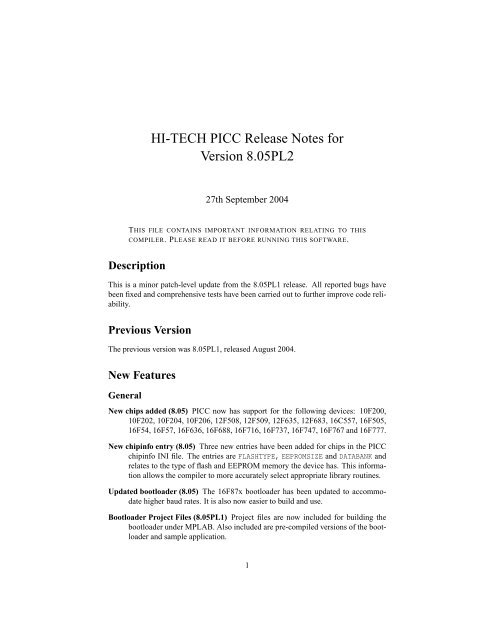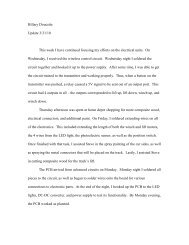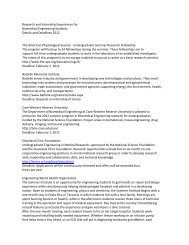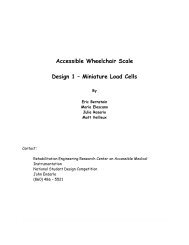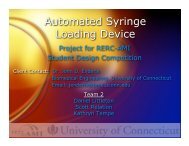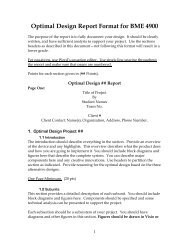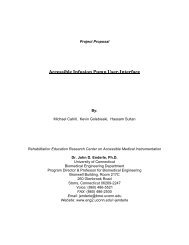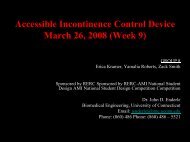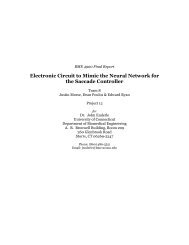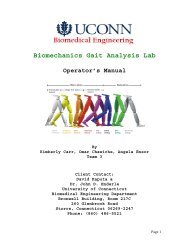HI-TECH PICC Release Notes for Version 8.05PL2
HI-TECH PICC Release Notes for Version 8.05PL2
HI-TECH PICC Release Notes for Version 8.05PL2
You also want an ePaper? Increase the reach of your titles
YUMPU automatically turns print PDFs into web optimized ePapers that Google loves.
<strong>HI</strong>-<strong>TECH</strong> <strong>PICC</strong> <strong>Release</strong> <strong>Notes</strong> <strong>for</strong><br />
<strong>Version</strong> <strong>8.05PL2</strong><br />
27th September 2004<br />
T<strong>HI</strong>S FILE CONTAINS IMPORTANT INFORMATION RELATING TO T<strong>HI</strong>S<br />
COMPILER. PLEASE READ IT BEFORE RUNNING T<strong>HI</strong>S SOFTWARE.<br />
Description<br />
This is a minor patch-level update from the 8.05PL1 release. All reported bugs have<br />
been fixed and comprehensive tests have been carried out to further improve code reliability.<br />
Previous <strong>Version</strong><br />
The previous version was 8.05PL1, released August 2004.<br />
New Features<br />
General<br />
New chips added (8.05) <strong>PICC</strong> now has support <strong>for</strong> the following devices: 10F200,<br />
10F202, 10F204, 10F206, 12F508, 12F509, 12F635, 12F683, 16C557, 16F505,<br />
16F54, 16F57, 16F636, 16F688, 16F716, 16F737, 16F747, 16F767 and 16F777.<br />
New chipinfo entry (8.05) Three new entries have been added <strong>for</strong> chips in the <strong>PICC</strong><br />
chipinfo INI file. The entries are FLASHTYPE, EEPROMSIZE and DATABANK and<br />
relates to the type of flash and EEPROM memory the device has. This in<strong>for</strong>mation<br />
allows the compiler to more accurately select appropriate library routines.<br />
Updated bootloader (8.05) The 16F87x bootloader has been updated to accommodate<br />
higher baud rates. It is also now easier to build and use.<br />
Bootloader Project Files (8.05PL1) Project files are now included <strong>for</strong> building the<br />
bootloader under MPLAB. Also included are pre-compiled versions of the bootloader<br />
and sample application.<br />
1
New Sample Code (8.05PL1) A new sample program designed to run on the PIC-<br />
DEM2 plus demo board is now included in the compiler’s samples directory.<br />
Driver<br />
New option (8.05) An option has been added to allow more control over the RAM<br />
usage in a project.<br />
• The -BANKCOUNT=number option allows the user to specify the number of<br />
RAM banks used in a project. Normally the compiler will assume that all<br />
RAM banks of the processor may have been used. If the user can assure that<br />
the compiled program doesn’t require all of the banks, then the compiler<br />
can per<strong>for</strong>m additional code size optimizations. This is particularly useful<br />
to processors that have four RAM banks but two of the banks only contain<br />
SFR’s (16F72/73/74, 16F870/871/872/873/874, etc...). The allowable bank<br />
counts are: 1,2,3 or 4.<br />
Code Generator<br />
New optimizations (8.05) An additional optimization has been added to the code generation<br />
stage of the compiler.<br />
Assembler<br />
• Additional code size optimizations may be done <strong>for</strong> processors that have<br />
four RAM banks but only two are available <strong>for</strong> general purpose RAM.<br />
New optimizations (8.05) New optimizations have been added to the assembler stage<br />
of the compiler. These optimizations will only become apparent when the assembler<br />
optimizer is enabled.<br />
Changes<br />
<strong>Release</strong> notes<br />
• There has been improvements to an optimization which will attempt to convert<br />
two bit clear on status instructions (bcf) to a single clear file register<br />
(clrf) instruction.<br />
• A new function inlining optimization has been implemented. This optimization,<br />
if efficient to do so, will attempt to inline small functions rather<br />
than call them. When applied, this optimization has the potential to reduce<br />
stack usage and/or code size.<br />
Readme and bugfixes files (8.05) The readme and bugfixes files have been merged<br />
into a single (README) file and contains more detailed in<strong>for</strong>mation about the release.<br />
2
Header files<br />
Changes <strong>for</strong> flash and EEPROM macros (8.05) Previously the flash and EEPROM<br />
access macros and function definitions <strong>for</strong> each chip were defined in that chip’s<br />
specific headerfile, this is no longer the case. As well as the existing EEP-<br />
ROM_SIZE definition, the preprocessor will now define a symbol to indicate<br />
what type of flash access it uses. In pic.h the combination of the FLASH and<br />
EEPROM symbols will determine what sort of access macros to provide.<br />
PICINFO.INI file<br />
12F635 ICD ranges (8.05PL1) The reserved memory locations required <strong>for</strong> using the<br />
ICD2 with the 12F635 has been updated in accordance with the latest Microchip<br />
documentation.<br />
HPDPIC<br />
No longer supported (8.05) The text-based IDE HPDPIC will no longer be supported.<br />
It will still be included with the compiler and it still works, however some some<br />
processors cannot be selected, the compiler’s string packing feature is disabled<br />
and the EEPROM read/write library routines will not automatically be included<br />
if called.<br />
Limitations<br />
Demo Mode<br />
Disabled options After installtion this version of the compiler will run in demo mode.<br />
When operating in demo mode, compilation of programs will be slower then<br />
normal and some command-line options are disabled. The following is a list of<br />
the disabled options:<br />
• -D to predefine macro symbols<br />
• -L to specify libraries to be scanned by the linker<br />
• -L-opt to allow specification of additional linker options<br />
• -M map file generation<br />
• -NORT to disable runtime code inclusion<br />
• -PRE to only preprocess source files<br />
• -RESRAM to reserve RAM ranges<br />
• -RESROM to reserve ROM ranges<br />
• -U to undefine macro symbols<br />
• -V <strong>for</strong> verbose compilation messages<br />
The compiler will continue to operate in demo mode <strong>for</strong> 21 days, after which it will<br />
cease to function. If you have purchased this compiler, these limitations may be removed<br />
by running the activation program. Visit <strong>HI</strong>-<strong>TECH</strong> Software’s web site <strong>for</strong><br />
further details about activation/registration.<br />
3
Preprocessor<br />
Incorrect result <strong>for</strong> sizeof The result of the sizeof preprocessor operator when applied<br />
to a pointer will always return 1. Use of the C sizeof operator will return<br />
the correct value.<br />
Parser<br />
Missing parenthesis not detected A missing end parenthesis is not detected in variable<br />
declarations when the variable is type cast. For example,<br />
static char C @ ((unsigned)&PORTA;<br />
This problem does not appear to affect any output code, but may cause problems<br />
when using third-party software tools.<br />
Qualified arrays generate error The compiler generates an error when compiling<br />
complicated qualified arrays, e.g.:<br />
const char * const * const listnames[] = {menu0, menu1};<br />
The error is not issued if the array is not qualified, or <strong>for</strong> arrays of more basic<br />
types.<br />
Structure initialization Locally defined structures cannot be initialized.<br />
Code Generator<br />
Functions returning ROM structure For Highend devices (17Cxxx), a function cannot<br />
return a copy of a structure which resides in ROM.<br />
Indirect function calls For Highend devices (17Cxxx), certain indirect function calls<br />
with more than one byte of argument may produce incorrect code.<br />
Functions as arguments to printf The argument list to printf or sprintf should not<br />
include function calls. For example,<br />
printf(“x = %f, sin(x) = %f\n”, x, sin(x*3.141592/180.0));<br />
This code demonstrates a workaround:<br />
y = sin(x*3.141592/180.0);<br />
printf(“x = %f, sin(x) = %f\n”, x, y);<br />
Error on initialization of complex bitfields Any structure using bitfields within a structure<br />
or union cannot be initialized. For example, using the following types where<br />
a structure is a member of a union, initialization of the structure’s bitfields will<br />
generate an error.<br />
4
typedef struct {<br />
unsigned b0:1, b1:1, b2:1, b3:1, b4:1, b5:1, b6:1, b7:1<br />
} byte_bits;<br />
typedef union {<br />
byte_bits bits;<br />
char byte;<br />
} byte_or_bits;<br />
This will generate a compiler error:<br />
byte_or_bits example = { {1,0,1,1,0,1,0,0 } };<br />
Instead, use a single value:<br />
byte_or_bits example = { 0b10110100 };<br />
Multiple block variable declaration Functions which have variables declared within<br />
multiple blocks where code within the block requires the use of temporary memory,<br />
may get corrupted when compiled with global optimizations. A workaround<br />
is to move the inner variable declaration outsize of the block.<br />
Libraries<br />
Minimum floating point value The floating point math libraries cannot per<strong>for</strong>m operations<br />
predictably on numbers below the order of 1e-35. The result is either<br />
correct or zero.<br />
Bug Fixes<br />
The following are descriptions of bugs that were present in the previous versions of<br />
this compiler, and which have been fixed in this release.<br />
Driver<br />
Crash linking many files (8.05PL1) For projects with greater than 100 files, the driver<br />
may crash at the link stage. The driver has been updated to account <strong>for</strong> projects<br />
of this size.<br />
Preprocessor<br />
Warning level ignored (8.05PL1) The -W warning level option was ignored by the<br />
preprocessor which resulted in some warning not being shown. This has been<br />
corrected.<br />
5
Preprocessor crashes scanning macros (8.05) A problem with the preprocessor may<br />
cause it to crash when processing macros which have trailing parenthesis missing.<br />
The preprocessor has been altered so as to produce an error message if the trailing<br />
parenthesis is omitted.<br />
Preprocessor crashes on macros functions (8.05) A problem with the preprocessor<br />
may cause it to crash when processing macros which take parameters but were<br />
called with the wrong number of parameters.<br />
The preprocessor has been altered so as to produce an appropriate error message.<br />
Preprocessor treats constants as signed (8.05) The preprocessor incorrectly treats all<br />
constants as signed values. This may lead to unexpected results if using the preprocessor<br />
to compare values. For example #if 1 > 0xFFFFFFFF should be a<br />
false condition if the second operand is treated as unsigned, but true if treated as<br />
signed.<br />
The preprocessor has been fixed to follow the ANSI standard. Values are considered<br />
to be 32-bit values by the preprocessor.<br />
Parser<br />
Crash on missing comma (8.05) A problem in the parser (P1) may cause it to crash<br />
when parsing an enumerated type definition that has a missing comma between<br />
enumerators in the list.<br />
The parser will now generate an error if such a condition is encountered.<br />
Crash on missing union tag (8.05) If a variable declaration is per<strong>for</strong>med using a union<br />
tag that is yet to defined, the parser may crash. For example: union tag var =<br />
{1}; // tag not yet defined<br />
The parser has been changed to handle this correctly.<br />
Hang on missing specifier (8.05) In some instances calls to printf functions where the<br />
parameter was given but no specifier caused the parser to hang. For example:<br />
sprintf(buffer,”The number is”,number);<br />
The parser will now generate an appropriate error message.<br />
Error given <strong>for</strong> LU suffix (8.05) The parser generates an error when encountering<br />
constants with an LU suffix.<br />
This syntax is now accepted.<br />
Code Generator<br />
Variable argument functions not returning (<strong>8.05PL2</strong>) For baseline (12bit) processors,<br />
functions that are not qualified as fastcall and which have a variable number<br />
of arguments (...) may not return. Printf is such a function and runs correctly,<br />
but never returns. Such functions now work as expected.<br />
6
IRP bit selection after call (<strong>8.05PL2</strong>) When an XOR, OR or plus operation occurred<br />
on a char object which required to be accessed indirectly following a function<br />
call in which the IRP bit was modified, the result may incorrectly be assigned to<br />
the wrong bank. This has been fixed.<br />
IRP bank selection bit corruption (8.05) A problem in the code generator lead to the<br />
IRP bank selection bit possibly getting corrupted over a function call. The problem<br />
only manifested itself when assembler optimizations were applied.<br />
The code generator now assumes the IRP bit may get corrupted over a function<br />
call and ensures it is set correctly after the call.<br />
Incorrect bank selection after if (8.05) The wrong bank may get selected <strong>for</strong> midrange<br />
PICs with four banks after an if statement that tests bit object in different<br />
banks. For example:<br />
int i;<br />
if ((RCIF & RCIE)|(TXIF & TXIE))<br />
++i;<br />
--i; //possible wrong bank selection here<br />
The problem has now been fixed.<br />
Assembler<br />
SET/EQU (8.05PL1) Added code to test that SET or EQU doesn’t have the same name<br />
as a macro.<br />
Bank select problem (<strong>8.05PL2</strong>) An assembler optimization problem caused the wrong<br />
bank to be selected in some instances where an assembler level label had multiple<br />
paths of arrival where each path had a different bank selected. This typically<br />
happened where there are many comparisons in a row (eg: switch statements,<br />
multiple if comparisons) followed by access to an object in a bank other than<br />
bank0, followed by a return. This has been fixed.<br />
Wrong bank selected (8.05PL1) A bank selection problem may occur in code which<br />
uses many ’if’ statements in a row, which tested bit objects. This tends to affect<br />
code which is typically written <strong>for</strong> interrupt routines and there<strong>for</strong>e may result in<br />
some ’if’ statements evaluating incorrectly. This problem has been fixed.<br />
Crash with assembler optimizations (8.05) With the assembler (ASPIC) optimizers<br />
enabled, certain very specific sequences of code caused the assembler to crash.<br />
This problem is quite rare and did not affect generated code if the assembler ran<br />
to normal completion.<br />
This problem has now been fixed.<br />
7
Cromwell<br />
Erroneous output on complex return types (8.05) For some functions which use a<br />
complex return type (structure/union pointers) the COF file output may be incorrect.<br />
This problem has been fixed.<br />
Header Files<br />
Missing SSPIE definition (<strong>8.05PL2</strong>) The SFR definition <strong>for</strong> SSPIE was missing <strong>for</strong><br />
the 16C774 processor. This has now been added.<br />
Incorrect SFR addresses (8.05PL1) Some of the SFR definitions in the PIC16F87.H<br />
header file were incorrect. This affected their use on the PIC16F87 and PIC16F88<br />
processors. This has now been corrected.<br />
Typo in 16F7x7 header (8.05) There was a typo in the pic16f7x7.h header file which<br />
resulted in some SFRs not being defined correctly. This has been updated.<br />
PICINFO.INI file<br />
Incorrect ICD2 reservations (<strong>8.05PL2</strong>) The memory ranges required to be reserved<br />
when using the MPLAB-ICD2 on the 16F688 or 12F683 was not correct. This<br />
has been adjusted.<br />
Insufficient RAM definition (8.05PL1) The RAM definition <strong>for</strong> bank 0 of the 16F636<br />
was less than it should have been. This may have resulted in the compiler giving<br />
an out of space error earlier than expected. The correct RAM range has now<br />
been added.<br />
Missing RAM definition (8.05PL1) The RAM definition <strong>for</strong> bank 2 of the 16F688<br />
was missing. This definition has now been added.<br />
Incorrect EPPROM size (8.05PL1) The value of the pre-processor define EEPROM_SIZE<br />
which is obtained from the PICINFO.INI file was incorrect. This has been adjusted<br />
to the correct values.<br />
Incorrect RAM ranges (8.05) The RAM ranges given <strong>for</strong> the rf12F675 (ie, 12F675F/H/K)<br />
was incorrect.<br />
Library Code<br />
Floating point calculations (<strong>8.05PL2</strong>) The library routines ldexp, sqrt, exp, pow,<br />
sinh, cosh & tanh in some instances would erroneously return values of zero.<br />
This has been corrected.<br />
Leap year day incorrect (8.05PL1) The day of the week calculated <strong>for</strong> February 29th<br />
which is generated by the time functions (ctime) was incorrect. This has now<br />
been corrected.<br />
8
Floating point exponent (8.05PL1) The exp() and ldexp() routines did not correctly<br />
do bounds checking where the exponent may overflow. This meant that<br />
caclulations that overflowed returned a result which is significantly incorrect.<br />
These routines now check the limits and will return a maximum value or zero<br />
where appropriate.<br />
Undefined symbol <strong>for</strong> string packing (8.05PL1) The 16F87 and 16F88 processors,<br />
although capable of the string packing optimization, were not getting the correct<br />
library routine linked in to handle it. This would result in an undefined symbol<br />
uses_packed_strings.<br />
The correct library is now linked accordingly.<br />
Incorrect results <strong>for</strong> 32-bit doubles (8.05) Some four-bank processors were not getting<br />
the correct library routine linked which resulted complex assignments (+=,-=,*=,/=)<br />
involving objects in bank 2 and 3 to give incorrect results.<br />
The correct library is now linked accordingly.<br />
Incorrect results <strong>for</strong> atof() and strtod() (8.05) A problem in strtod() (atof() shares<br />
code with this function) may cause an incorrect result if there are leading zeros<br />
specified with the exponent. Only the first two digits of the exponent were read<br />
so that code similar to atof("1.7546e003") will return a value with incorrect<br />
exponent.<br />
The source <strong>for</strong> this function has been corrected and new libraries compiled.<br />
Updates<br />
Monitor the announcements <strong>for</strong>um on <strong>HI</strong>-<strong>TECH</strong> Software’s web site <strong>for</strong> in<strong>for</strong>mation<br />
relating to new versions or patches, and/or subscribe to our announcement mailing list<br />
- send email to <strong>HI</strong>-<strong>TECH</strong> Software’s mailing list <strong>for</strong> more in<strong>for</strong>mation.<br />
9


